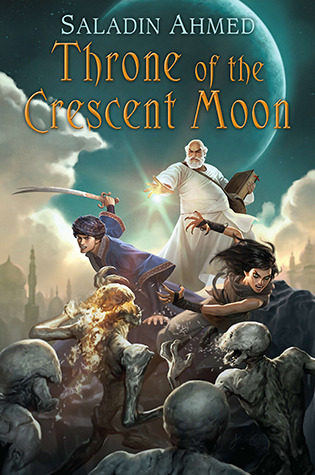
I have tried to start this review three or four times now, and I'm having trouble getting going. I think I may have finally put my finger on what was holding me back. It's that this book is really good, and yet it wasn't quite as breathtaking as I wanted it to be. Which, don't get me wrong, is not a bad review. When I say it's really good, it's really good. I think that in my head, though, I was expecting it to be a masterpiece, and it's not quite that.
So why did I have that expectation? I suppose it's because I follow Saladin Ahmed on Twitter, and really enjoy reading what he has to say there. And because the one short story of his that I've read (and reviewed) was amazingly good. I suppose I knew that this had made a big splash when it came out, was nominated for a ton of awards. I think it was deservedly nominated for those awards.
It's just, unfortunately, how I built it up in my brain. Prolonged expectations are often not your friend, as it creates a mindspace that very damned little could have lived up to.
So let's try to put that weird expectation aside and look at what this book is - very good fantasy, in a Middle Eastern setting, in as far as that's a good term for a fictional world, which it kind of isn't. But this isn't Nordic questing for a ring or a cup or some other damned thing, and I'm grateful for it.
Instead, we start with an elderly ghul hunter, Adoulla, who is proudly a city dweller, and has protected his home from ghuls for most of his life. He's practically the last of his kind - his best friends in the trade, a married couple, having retired. He is helped in his duties by Raseed, a dervish warrior who is trying to be far more pure than Adoulla would really like. While out in the desert tracking down some particularly nasty ghuls, they run into the last survivor of a nomadic band, a girl who can take lionshape in battle.
Going back to the city, they are attacked by even more deadly creatures, of a kind Adoulla has never seen. Strong necromantic powers are on the move - and internal politics are scarcely less dangerous. The new khalif is really a terrible ruler, and a popular leader and thief who calls himself the Falcon Prince is inciting a rebellion.
The core of this book, and something I really enjoyed, is people trying to figure out what a good life looks like, with varying amounts of strictness, and then trying to reconcile that with the world as it is. Tie into this a more dire threat than has arisen before, more than three experienced ghul hunters and two inexperienced but talented young people, and the question of how a city should be rules - there's lots here, and it's all exactly up my alley.
So I need to let go of whatever book I had floating around in my head, and appreciate this book for what it is - damned good fantasy, with provocative ideas and characters who are trying to be true to themselves in the midst of chaos. I appreciate that it's urban, too - it's enjoyable to see a different kind of city from the modern metropolis or steampunk London, with a main character who is a city dweller and loves it. We have so much pastoral fantasy that I enjoy the shift in emphasis.
Seriously, this book deserves the recognition it got. I'm not convinced it's a masterpiece, but it's really good fantasy, and I look forward to more.
I read this book as part of an attempt to read all the Hugo Nominees
Going back to the city, they are attacked by even more deadly creatures, of a kind Adoulla has never seen. Strong necromantic powers are on the move - and internal politics are scarcely less dangerous. The new khalif is really a terrible ruler, and a popular leader and thief who calls himself the Falcon Prince is inciting a rebellion.
The core of this book, and something I really enjoyed, is people trying to figure out what a good life looks like, with varying amounts of strictness, and then trying to reconcile that with the world as it is. Tie into this a more dire threat than has arisen before, more than three experienced ghul hunters and two inexperienced but talented young people, and the question of how a city should be rules - there's lots here, and it's all exactly up my alley.
So I need to let go of whatever book I had floating around in my head, and appreciate this book for what it is - damned good fantasy, with provocative ideas and characters who are trying to be true to themselves in the midst of chaos. I appreciate that it's urban, too - it's enjoyable to see a different kind of city from the modern metropolis or steampunk London, with a main character who is a city dweller and loves it. We have so much pastoral fantasy that I enjoy the shift in emphasis.
Seriously, this book deserves the recognition it got. I'm not convinced it's a masterpiece, but it's really good fantasy, and I look forward to more.
Booklinks:
I read this book as part of an attempt to read all the Hugo Nominees
No comments:
Post a Comment